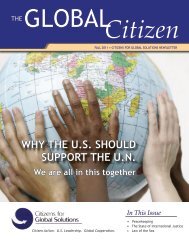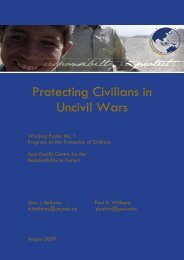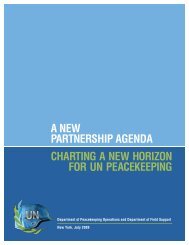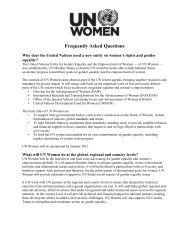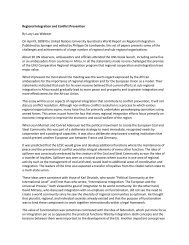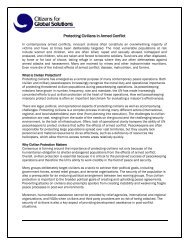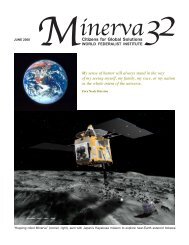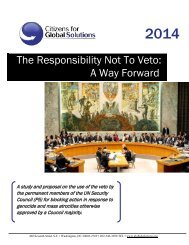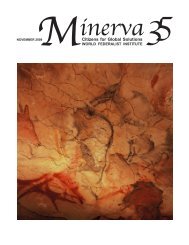Minerva, Fall 2011 - Citizens for Global Solutions
Minerva, Fall 2011 - Citizens for Global Solutions
Minerva, Fall 2011 - Citizens for Global Solutions
- No tags were found...
Create successful ePaper yourself
Turn your PDF publications into a flip-book with our unique Google optimized e-Paper software.
Human Rights”. The establishment ofa working group on the issue of humanrights and transnational corporations andother business enterprises, consisting offive independent experts to be appointedat the 18th session in September <strong>2011</strong>, is asignificant step toward building a cultureof human rights. The resolution did havesome important negotiated paragraphs,such as country visits, along with numerousmentions recognizing the disproportionateimpact on indigenous peoples dueto corporations, and potential identificationof best practices to serve as models. Itwill be seen whether five experts, insteadof the previous one expert, will be morebeneficial <strong>for</strong> people whose lives are impactedby industries. Also, the agenda andcapacity to advocate at the new Forum onBusiness and Human Rights remains tobe determined, but is a potential opportunity.One of the most significant contributionsof transition from the UN Commission onHuman Rights to the UN Human RightsCouncil was the creation of the UniversalPeriodic Review. While states believedthe peer review would reduce politicizationand eliminate the singling out ofstates, with a universal review of rights<strong>for</strong> all states equally, it has turned out tobe an important opportunity <strong>for</strong> stakeholdersto pose questions and make recommendations<strong>for</strong> states to improve theirhuman rights record. The 17th sessionshowed interest in continuing to improvethe process <strong>for</strong> greater participation. TheMoroccan ambassador played a pivotalrole in the review of the UPR and newmodalities <strong>for</strong> the second cycle.Decision A/HRC/17/L.29 outlines specificshifts in the second cycle <strong>for</strong> stakeholdersand states. The key factor is an increasein the time <strong>for</strong> the duration of the review.The current 3-hour review in the firstcycle was seen as inadequate, with stateslining up early and still not being able toparticipate. There<strong>for</strong>e, the new review ofstates will be 3.5 hours. States will get 70minutes instead of 60 and other states 140minutes <strong>for</strong> questions, adding around 10more states to the speakers list. There willalso be 14 sessions per cycle as opposedto the current 12, and 14 states reviewedinstead of the current 16. States will have4.5 years in between each UPR review insteadof 4 years.The second cycle will begin in May/June2012. National Human Rights Institutionsachieved a dedicated section in thesummary of the stakeholder in<strong>for</strong>mation.NHRIs also will be given the floor directlyafter the state under review.On the final days of the 17th session, itbecame clear that another hurdle wouldbe overcome. Laura Dupuy Lasserre,a Uruguayan diplomat, would becomethe first female president of the HumanRights Council, six decades after EleanorRoosevelt held the post of Chair of theUN Commission on Human Rights. DupuyLasserre is a human rights defendershaped by her life experience; her fatherwas arrested and tortured as a union leaderby a dictatorship <strong>for</strong> demanding a democracy.Freedom was a banned word in hercountry. Now she will head the UN bodywith the task of guaranteeing all peopleon the planet a right to freedom. DupuyLasserre also brings experience focusingon gender justice and environmental issuesto her presidency.The 17th session and special focus on the“Arab Spring” indicate a shift in humanrights consciousness in the world. At futuremeetings of the UN Human RightsCouncil, civil society will continue to exertleverage <strong>for</strong> trans<strong>for</strong>mation with thelanguage of human rights.My personal commitment to thiscause, apart from deriving fromshared national values where democracyand social justice go handin hand, also involves having seenfrom very close by the injustices ofdictatorship. These directly affectedmy family. My father was a politicalprisoner and tortured, like manyother victims who I wish to honourtoday.~ Laura Dupuy Lasserre,from Uruguay — new president ofthe UNHRC, replacing Thailand’sSihasak Phuangketkeow (UN Radio,12 July <strong>2011</strong>)27 • <strong>Minerva</strong> #39 • November <strong>2011</strong>IV • UN PFII ~ The tenth anniversary ofthe United Nations Permanent Forumon Indigenous Issues signals a significantdevelopment <strong>for</strong> indigenous peoplesin the international arena. It allows oneto reflect on the important initiatives thathave been inspired by indigenous ingenuityat this international institution.The most important is being welcomedinto the family of nations, as was doneby <strong>for</strong>mer Secretary General Kofi Annan,and being treated as equals in dignityalong with respect <strong>for</strong> indigenous wisdomas is being gained with regard to globalenvironmental issues.On 16 May, the two-week annual PFIImeeting was launched by Secretary GeneralBan Ki-moon in the UN General Assembly.“The road has been tough, but therewards are real,” he noted. “The UnitedNations Declaration on the Rights of IndigenousPeoples finally has the consensusit deserves. Now we need to make theDeclaration’s principles a reality. To thosewho do not grasp the Declaration’s importance,I say: protecting and promotingthe rights of indigenous peoples benefitsus all.”Indeed, it was the annual meeting everySpring that the world’s indigenous peoplesused as a springboard to secure thevotes of states <strong>for</strong> the adoption of the UNDeclaration on the Rights of IndigenousPeoples. To achieve universal adoption onthe anniversary of its decade of existencewas extraordinary, with the United Statesof America finally reversing its position.Secretary General Ban Ki-moon understandsthe need <strong>for</strong> genuine partnershipwith indigenous peoples, pointing outabout the planet: “Indigenous peopleshave been living in a ‘green economy’ <strong>for</strong>centuries. When economists today look<strong>for</strong> new ways to achieve sustainable development,they should look at old practicesin indigenous communities. Ancientindigenous traditions can help overcomemodern problems. The goal is not to appropriateyour knowledge — to extract itor exploit it — but to respect indigenouspeoples and help preserve their traditions.”[continued]



